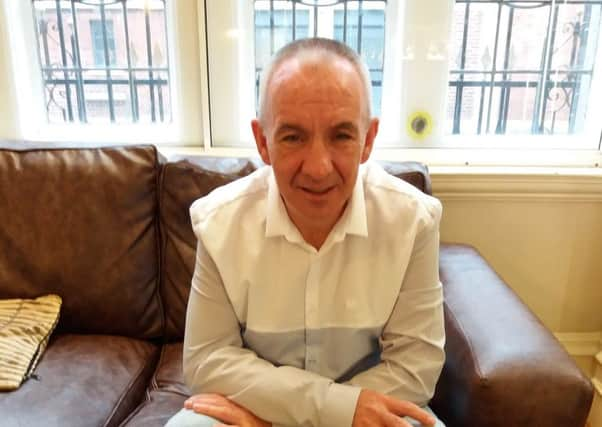Iraq war veteran's battle with drugs


After fighting for his country, RAF crewman Nick Fuller had an devastating journey which took him from PTSD, to addiction and sleeping on the streets of Mansfield – and now remarkably he is finding his feet again.
He said: “I was sleeping rough in Mansfield for a while and then I got into shared housing in Kirkby.”
Advertisement
Hide AdAdvertisement
Hide Ad“Usually I was out of my face and drowned everything out. “I was on my own out there, taking heroine, crack cocaine, and drinking 1 litres of white cider a day.”
It had been a hard fall after he was abandoned by the military – the former Royal Air Force medic said all he ever wanted to do was serve in the military, and he toured in Kuwait and Iraq in the first Gulf War in 1991.
Nick, originally from Liverpool, told of how a roadside bomb hit his squad, leaving the 47-year-old with leg injuries, and Post Traumatic Stress Disorder.
He said: “My ambulance was ripped to shreds. Three mates I was with lost their lives and I got bad injuries to my legs and knees.
Advertisement
Hide AdAdvertisement
Hide Ad“I was thrown on the scrap heap - they say you’re no good to us anymore and that’s it.” In addition to chronic pain due to his injuries Nick suffered with PTSD and the pills he was given hardly took the edge off.
“I was suffering really badly with night terrors, going back to the situations I’d been in and the thing’s I’d seen in Iraq. It’s more intense than a nightmare – all the sounds and smells – the fear can be debilitating.”
“I was taking painkillers by the handful and someone showed me a bit of brown powder on a square of paper and said ‘try this’.”
That was in 1995, and it was only a few short months ago when Nick was picked up off the streets by the council and put into their Tideswell temporary housing unit for homeless people.
Advertisement
Hide AdAdvertisement
Hide AdBut his road to seeking help wasn’t over. After a binge, he had a seizure and wound up back in Hospital. Luckily he was discovered by a council ASSIST scheme which makes sure hospital patients are discharged into suitable accommodation, and he was able to get on an intensive rehabilitation programme.
Now Nick lives in assisted housing in Burton-on-Trent, and after more than a decade of using drugs to kill the pain, he’s got real hope for life.
He added: “Getting into rehab is the best thing that anyone in that life can do. It gives you a whole new way of thinking – the person you’ve forgotten who you were. You feel that person coming back. And if I can do it then anybody can.”
The council’s ASSIST hospital discharge scheme to reduce “bed blocking” has saved the NHS £1.3m since it was started in 2014, earning it high praise in a new report. Together with Nottinghamshire County Council and the NHS, the council has changed the circumstances of 1,127 patients by either getting them into new accommodation of making modifications to their own home.
Advertisement
Hide AdAdvertisement
Hide AdBed-blocking is a huge issue nationally - last year 1.15 million days were spent unnecessarily on wards by patients who would have been discharged if it wasn’t for their home circumstances.
Portfolio Holder for Housing Cllr Barry Answer, said: “This is a marvellous scheme so we really hope there will be funding that enables it to continue. “It’s saved the NHS a huge amount of money, but also made a real difference to the lives of hundreds of patients - and that is something you cannot put a price on.”
Nick Fuller added said: “The ASSIST scheme basically saved my life. Doctors told me if I had carried on the way I was, I would have been dead in six to 12 months.”
Mansfield District Council Director of Communities added: “The significance of this scheme has been recognised nationally and we as a local authority are extremely proud to have been a trailblazer. We’re leading the way on how to work effectively together with other agencies to deliver a valuable service that not only saves money but in some cases may have saved lives, too, by helping some of our most vulnerable people.”